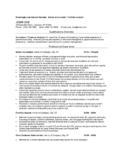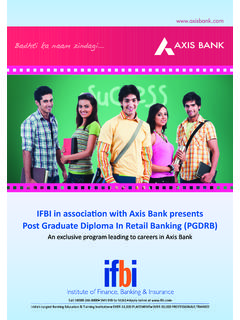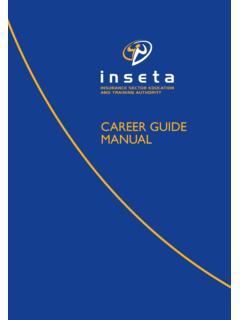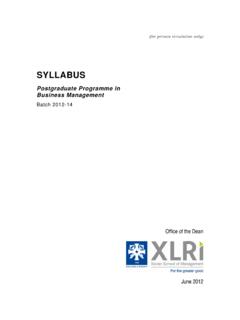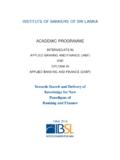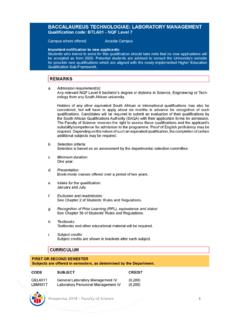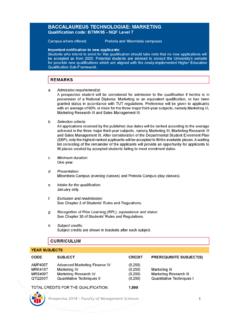Transcription of Post Graduate Diploma in Economics - Shivaji …
1 1 Shivaji UNIVERSITY, KOLHAPUR Department of Economics Revised Syllabus of post Graduate Diploma in Economics to be Introduced from June 2015 PROSPECTUS & SYLLABUS FOR post Graduate Diploma in Economics 1. post Graduate Diploma in Foreign Trade 2. post Graduate Diploma in Corporate Governance 3. post Graduate Diploma in Agri-Business 4. post Graduate Diploma in Quantitative Techniques and Computer Application 5. post Graduate Diploma in Financial Markets 6. post Graduate Diploma in IPR 7. post Graduate Diploma in Urban Banking 8. post Graduate Diploma in Co-operative Management 2 PROSPECTUS & SYLLABUS post Graduate Diplomas in Economics 1. Introduction: The new vistas of knowledge have compelled the world to adopt holistic approach in every branch of life. The traditional courses designed to provide specialization in particular area has lost touch with practical dimensions of the problems and hence the product of such a pattern student could not get its appropriate position in the labor market.
2 The flux of unemployed youth is increasing in number by leaps and bounds in one hand and dearth of knowledgeable and pragmatic people on the other suggests some serious inadequacy in the knowledge industry. This gap is the result of our present educational system where different streams of knowledge are treated separately as a watertight compartment. It has harmed the society in general and student community on particular. On this background, the Department of Economics has come out with a solution in terms of post Graduate Diploma Courses . The courses designed to bridge the gap between academic and professional needs on one hand between demand and supply of skills on the other. In the wake of globalization and liberalization, the demand for business executives specialized in the field of co-operative business, corporate governance, international business, agribusiness, IPRs, future and forward training, computer application, quantitative technique, co-operative banking, and Financial services has been growing along with the increase in demand for academicians, researchers in these fields.
3 Development in the respective areas on the one hand and the consequential impact of the same on India s economic activities in the other hand, call for an increasingly professional approach and business environments. Radical changes have been taking place in the techniques and approaches in the above mentioned areas. The courses are expected to meet the emerging requirements of the industry, banking services market and co-operatives by producing the trained post Graduate students. 3 2. Objective of the P. G. Diploma Courses 1. The course is designed to introduce recent developments in the field having professional and practical significance. 2. The course will help the administrators, entrepreneurs, policy makers to manage their units more professionally and competitive way. 3. The students opting for the bridge courses will be more employable compares to their other compared to their other friends who have not pored for such courses.
4 4. The courses will help in setting the bridge between professionalism along with academic excellence. The synergy if academic excellence and professionalism will benefit the student and society. 3). Course structure: I) post Graduate Diploma in Foreign Trade DFT-1: International Business Information, Strategy and Policy. DFT-2: Quantitative Technique and Computer Application. DFT- 3: International Marketing and Export Business. DFT-4: International Trade, Procedures, Documentation and Logistics. DFT-5: India s Foreign Trade. DFT-6: Short Dissertation - 50 Marks Seminar - 25 Marks Viva Voce - 25 Marks Total - 100 Marks Each paper from DFT -1 to DFT- 5 is of 100 Marks II) post Graduate Diploma in Corporate Governance DCG -1: Corporate Sector in India DCG -2: Corporate Governance DCG -3: Corporate Laws DCG -4: Corporate Finance DCG -5: Corporate Strategy and policy DCG -6: Short Dissertation - 50 Marks Seminar - 25 Marks Viva Voce - 25 Marks Total - 100 Marks Each paper from DCG -1 to DCG- 5 is of 100 Marks 4 III) post Graduate Diploma in Agri Business DAB -1: Introduction to Agri-Business DAB -2: Management of Natural Resources DAB -3: Farm Management DAB -4: Marketing of Agricultural Produce DAB -5.
5 Institutional Framework for Agri-Business DAB -6: Short Dissertation - 50 Marks Seminar - 25 Marks Viva Voce - 25 Marks Total - 100 Marks Each paper from DAB -1 to DAB- 5 is of 100 Marks IV) post Graduate Diploma in Quantitative Techniques and Computer Application DQTC- 1: Basics of Research Methodology DQTC- 2: Quantitative Techniques in Research - I DQTC- 3: Quantitative Techniques in Research - II DQTC- 4: Time series analysis DQTC- 5: Computer Application DQTC -6: Short Dissertation - 50 Marks Seminar - 25 Marks Viva Voce - 25 Marks Total - 100 Marks Each paper from DQTC -1 to DQTC- 5 is of 100 Marks V) post Graduate Diploma in Financial Market DFM -1: Money Market DFM -2: Capital Market DFM -3: International Financial Markets DFM -4: Corporate Finance DFM -5: Insurance and Investment DFM -6: Short Dissertation - 50 Marks Seminar - 25 Marks Viva Voce - 25 Marks Total - 100 Marks Each paper from DFM -1 to DFM- 5 is of 100 Marks 5 VI) post Graduate Diploma in IPRs DIPR- 1: Introduction to IPR DIPR- 2: IPR in Industrial Activities DIPR- 3: IPR in Agriculture Sector DIPR- 4.
6 IPR in Service Sector DIPR- 5: Institutional/Legal Arrangement of IPR s DIPR- 6: Short Dissertation - 50 Marks Seminar - 25 Marks Viva Voce - 25 Marks Total - 100 Marks Each paper from DIPR -1 to DIPR- 5 is of 100 Marks. VII) post Graduate Diploma in Urban Co-Operative Banking DUB-1: Co-Operative Thoughts and Administration DUB-2: Urban Credit Movement in India DUB-3: Urban Banking- I DUB-4: Urban Banking- II DUB-5: Risk and Financial Management DUB-6: Short Dissertation - 50 Marks Seminar - 25 Marks Viva Voce - 25 Marks Total - 100 Marks Each paper from DUB -1 to DUB- 5 is of 100 Marks. VIII) post Graduate Diploma in Co-operative Management DCM-1: Co-Operative Thoughts and principles DCM-2: Co-Operative Movement in India DCM-3: Co-Operative Law and Administration DCM-4: Co-Operative Movement in Foreign Countries DCM-5: Co-Operative Movement in Maharashtra DCM-6: Short Dissertation - 50 Marks Seminar - 25 Marks Viva Voce - 25 Marks Total - 100 Marks Each paper from DCM -1 to DCM- 5 is of 100 Marks.
7 6 4). Nature of course Curriculum: The courses mentioned above are the post Graduate Diploma Courses in Economics . Graduate student of any faculty or studying in P. G. courses of any Faculty can also simultaneously complete one of the courses during his/ her study in any post Graduate Department. The idea behind this is that student when enters into the labor market with a basic P. G. Degree and Diploma in one of the professions can get potential opportunities of employment and entrepreneurship in the market. The time table is adjusted with the student s academic engagements. An employed person cans also complete one of the professional courses provided is employers allow to do so. 5). Duration: The post Graduate Diploma Courses will be 25 weeks duration commencing from August to February. The course curriculum will be conducted in both morning and evening sessions on holidays (Saturday and Sunday).
8 6). Eligibility: Graduate of any faculty from any recognized university in India and abroad are eligible to seek admission to the one year full time course, provided they satisfy the following conditions. 1. They should have secured at least 45 percent in aggregate at their Degree level(40 percent for backward community students) 7). Admission procedure: 1. All applications received will be secured as per the eligibility criteria. 2. Eligible candidates will be given academic rating based in the past Performance. 3. List of the candidatures provisionally selected for the programme will be based on the overall performance and as per the reservation policy of the state Government and the rule of University. 8). Fee Structure: For Regular P. G. Students of Shivaji University, Kolhapur. For other students and office bearers. Foreign Students. Rs. Rs.
9 Rs. 7 10). Intake Capacity: The intake capacity to each course is 50, out of which 50 percent will be drawn from employed persons if required. 11). Medium of Instructions: The medium of instruction for the courses shall be in English. 12). Award of Diploma : The student shall be eligible for the award of the respective Diploma after he/she has successfully completed all the prescribed course programme and has secured a minimum of credits in each papers and 5 credits aggregate in all papers. 13). Maximum time Limit for Completing the course programme: It is mandatory on the part of the each student to complete the whole programme within a period of 3 years from the date of admission to these courses. 14). Courses faculty: The economic Department has qualified and experienced faculty with specialization in diversified areas. The Department can draw on guest faculty comprising specialists from business enterprises, Government organizational, institute and other Department in the University.
10 15). Disciplinary rules as per Maharashtra University Act, 1994 and Shivaji University applies. 8 SYLLABUS P. G. Diploma IN FOREIGN TRADE Paper I: International Business Information Strategy and Policy (100 marks) Unit I: Sources of Business Information Unit II: Fundamental Concepts of Information System: Management information system (MIS)- Concept and definition - Structure of MIS, decision making process, Concept of information, MIS a tool for information process Unit III: Overview of Information Technology: Overview of HW, overview of SW, Overview of Telecommunication, Overview of Database Management; Internet and E-commerce; intranets and Extranets; MIS for Strategic advantage. Unit IV: Information for International Business and E-Commerce: Managing IT for Global environment: new plants for its implementation, matching IT plans with BIS, Security and ethical challenges.
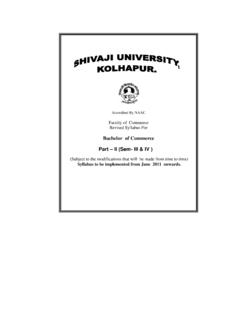
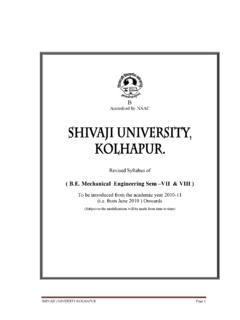

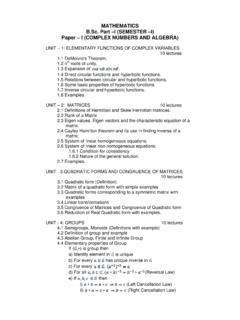
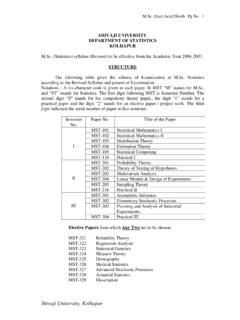




![Revised Syllabus For B.Sc, Part III [Mathematics] …](/cache/preview/d/b/6/0/d/d/1/e/thumb-db60dd1ea7378bffcc12e6f47a9540f5.jpg)
